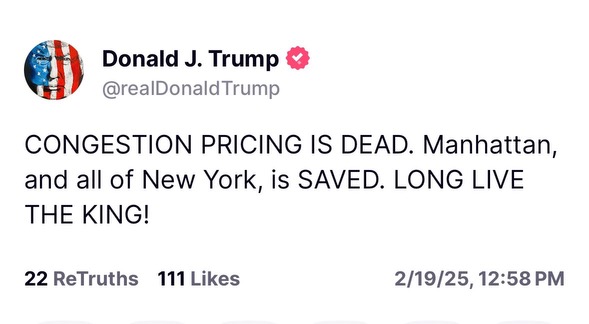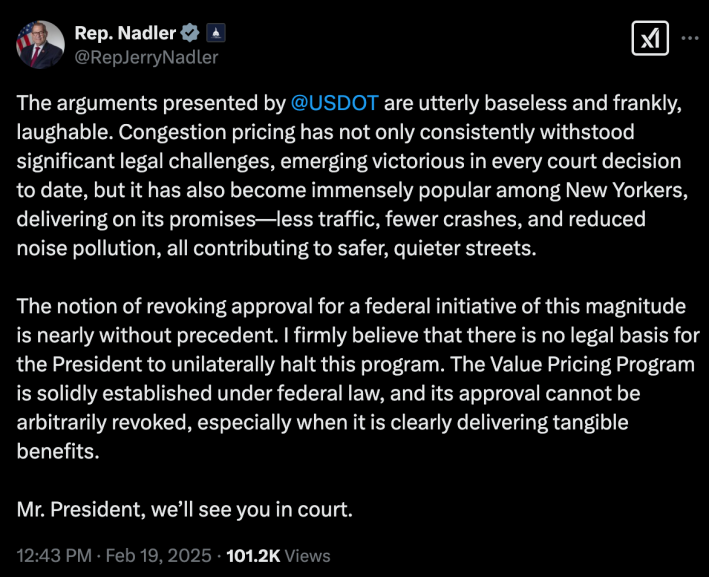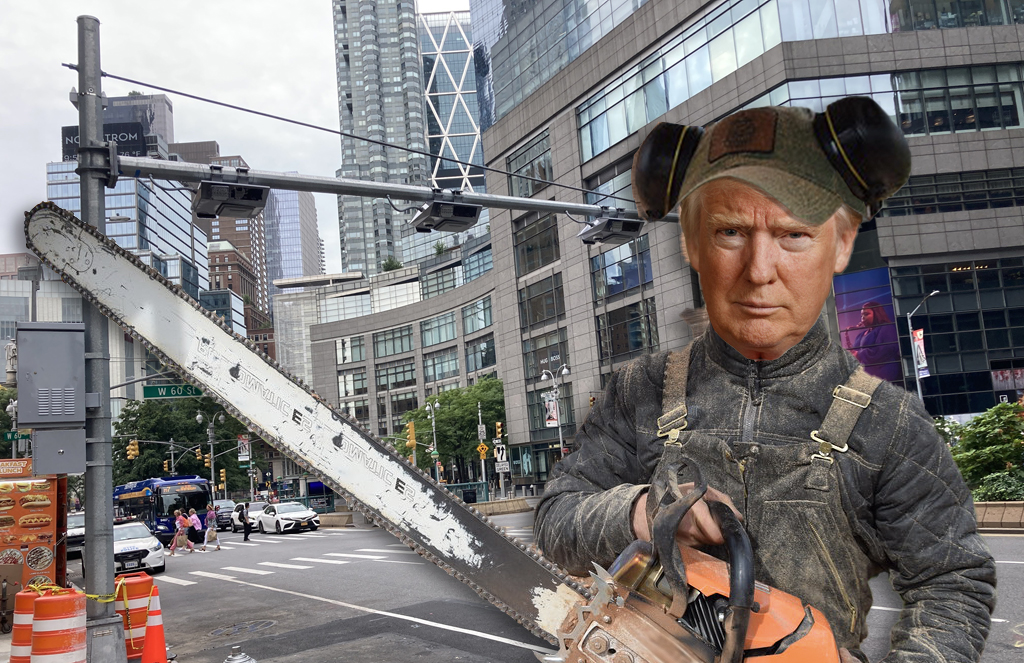Transportation Secretary Sean Duffy's announcement that the Trump administration was pulling federal approval of the congestion pricing program is based on a never-tested interpretation of federal law that Congress never meant to authorize congestion pricing under the law that legalized tolling federally funded highways.
So can he do that? On the one hand: no!
"The Federal Highway Administration approved congestion pricing and allowed it to start up," said Michael Gerrard, the founder of the Sabin Center for Climate Change Law at Columbia Law School. "It has survived several court challenges. It's not at all clear that they can legally revoke the approval now."
On the other hand, yes!
Duffy's reasoning relies on a pair of arguments. One, that "cordon pricing" is illegal under the Value Pricing Pilot Program, a 34-year-old set of rules that created case-by-case approval for states to put tolls on highways that had been built with help from the federal government. The Town of Hempstead, but no other opponents of congestion pricing, used this argument in its pending federal lawsuit against the toll — and Duffy said in his announcement that this flimsy legal logic would have prevailed in court (though he offered no evidence).

Duffy's other argument is that because the tolls are being used to fund public transit projects, congestion reduction isn't a main goal of congestion pricing — and, as such, the Federal Highway Administration lacked the legal authority to approve the toll in the first place.
That's news to city officials who worked with the federal government on the program during the last Trump administration.
"This whole thing is preposterous and ridiculous," said Justin Balik, who was director of state and federal affairs for the city Department of Transportation. "Congestion pricing under the Value Pricing Pilot Program was never considered anything that was controversial, even during the first Trump term. When we talked to [FHWA] about it, nobody said this isn't a candidate for the VPPP, nobody in discussions made that argument or tried to, because it's laughable that this was somehow not a fit."
This is also news to lawyers who've worked on the issue in court.
"[Secretary Duffy] just said this program was actually never lawful to begin with, that no administration could have authorized it," said Dror Ladin, an attorney at Earthjustice, which successfully sued Gov. Hochul over her decision to pause congestion pricing. "Their position is that from the get-go it never could have been authorized lawfully. And I don't think that that is a particularly persuasive reading of the law."
For weeks now, Streetsblog has reported that the federal government couldn't just rip up congestion pricing, and experts on the subject still think the same thing especially as Duffy seems to just throw in the towel on the argument that the Town of Hempstead made but has still not actually tested in court.
"This is a very slapdash, pretextual rationale, because it doesn't try to make any kind of convincing case on this legal question. It basically says, 'The Town of Hempstead has raised this legal issue, and rather than trying to get to the bottom of it, we think that everyone who's looked at [congestion pricing] and moved it forward did it in spite of this problem that's so obvious that we're not even going to take the time to really explain it or dig into it,'" said Ladin. "That that doesn't feel like an honest assessment of the program's legality, and it doesn't seem like the real reason why they're trying to end the program."
Duffy's decision-making process is also deficient, according to legal experts, because while his four-page missive to Gov. Hochul cites some of the codes and history around around prohibitions on tolling federally funded highways, these experts say the letter leaves out any previous U.S. DOT interpretations of the law that would justify this unilateral move to kill congestion pricing.
"Unsurprisingly, Duffy cites no statutory language authorizing the rescission," said New York University Constitutional law professor Roderick Hills Jr. "Instead he relies on 'long-standing history' of the VPPP — but, again, citing not one word from any agency or official ever mentioning the criterion that he just invented out of thin air. Even for an administration that likes to phone it in, this is pretty embarrassing."
Hills also pointed out that while Duffy makes the case that "cordon pricing" is a foreign concept to agencies and lawmakers, the concept has an extremely long history in America. Even if New York's program is the first congestion pricing program in American history, such a toll was absolutely known to lawmakers when Congress passed the Moving Ahead for Progress in the 21st Century (MAP-21) Act, an Obama-era federal transportation law, in 2012.
A FHWA fact sheet on the bill literally spells out that congestion pricing is allowed: "The Value Pricing Pilot Program, which allows congestion pricing, is continued."
"The idea that MAP-21 did not contemplate cordon pricing is laughable," said Hills. "That sort of pricing had been actively debated since the [Mayor John] Lindsay administration. If Congress wanted a carve-out for cordon pricing, then they could have put it in the statute. Duffy's just inventing an 'anti-cordon pricing' limit on this program. The letter cites not one website, agency guidance or comment supporting this completely invented exception."
And while Duffy also mentions in his letter that at least officially, congestion pricing was a "pilot" since it was included in the Value Pricing Pilot Program, and therefore the MTA should never have counted on the toll, the federal government has not suddenly pulled the plug or wound down any of the other toll programs included in the VPPP.
Longtime supporters of the toll also took aim at Duffy's arguments, with Rep. Jerry Nadler (D-Manhattan) promising to see the Trump administration in court.

Indeed, the MTA immediately filed a lawsuit in New York's Southern District arguing that the agreement signed by the MTA's Triborough Bridge and Tunnel Authority and federal government "does not include any provision authorizing FHWA to terminate the agreement. Rather ... only TBTA could unilaterally decide to discontinue the program."
The MTA also makes the case in its lawsuit that congestion pricing is the exact kind of market-driven idea that Duffy purports to want to see from states and is the exact kind of state policy experimentation that Balik said has been central to the relationship between states and the federal government.
"We have a diffuse transportation system where states are at the forefront of deciding what their policy should be, and the feds provide fiscal support for it. VPPP is not meant to be a statement of policy approval or disapproval. It's supposed to provide a framework for states to innovate, which is, in theory, devolving the authority and decision-making to states, which is what this administration purports to care about, except clearly when they have ideological battles that they want to pick," he said.
At the moment, the MTA's lawsuit has not been assigned a judge and the agency has not gone as far as asking for a temporary restraining order on Duffy's demand to end the toll. The Secretary's letter mentions says that the U.S. DOT will work with its state counterparts and the MTA on the "orderly cessation" of the toll. But Hochul does not seem ready to talk about that at the moment judging by her tweet declaring, "The cameras are staying on."

At a press conference on Wednesday afternoon, a full-throated Hochul said she was confident the MTA would prevail in court the same way the agency has prevailed every other time congestion pricing has gone in front of a judge. The governor also said the move to kill the toll was done specifically to hurt New Yorkers.
"It feels like the commuters of our city and our region are now the roadkill on Donald Trump's revenge tour against New York," Hochul told reporters.






